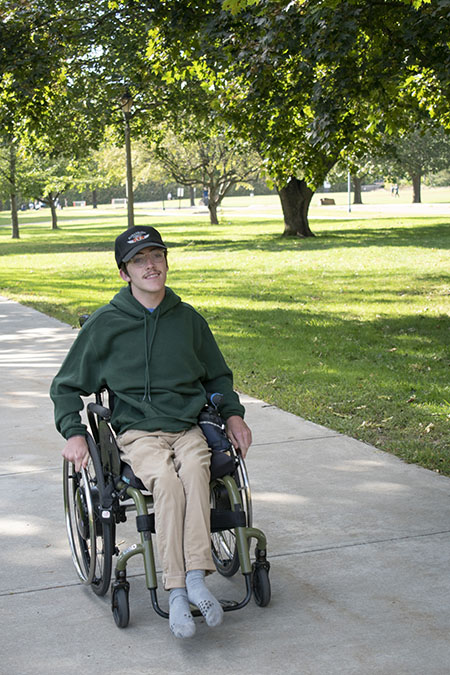
By Talia Perrea
Visionary Editor
When Nathan Besio was a student at St. Michael’s College in 1996, he had an experience that left him shaken. “I was the last one in the classroom, and I couldn’t get the door open. So I was basically trapped.”
Besio, now the peer advocate coordinator for the Vermont Center for Independent Living, is a strong advocate for accessibility across the state. He thinks it was either the weight of the door or type of doorknob that made it difficult to open with his prosthetic arms, and with no way to call anybody. “I was banging on the door, waiting for somebody to get me out, “ he said.
Besio, who relies on a wheelchair for transportation, said he believes that he was the second wheelchair user to live on campus, and the college has changed immensely since he graduated in 2000. As the number of students who need an accessible campus continues to rise, the college has made adjustments to buildings and grounds. But accessibility can still be an issue.
Jackson Greenleaf, ’23, recently ran into trouble on what should have been a normal trip to the bathroom. Whilst on the second floor of the library Greenleaf made his way into the bathroom where he ran into two problems. the handicapped stall had no support bars, mking him unable to get himself out of his wheelchair. Greenleaf ran into his second problem on his way out of the bathroom. The bathroom on campus was designed with an inner door and an outerdoor. Greenleaf made his way into the vestibule only to discover that the door leading out of the bathroom opened inwards trapping him in this space. Being a relatively small area, there was no way for him to maneuver his wheelchair to allow the door to open. Greenleaf texted his roommates with hopes that one of them could come and open the door for him, and was left to wait. Eventually another student came along to use the bathroom and let Greenleaf out.
“While we do a great job, there are things we still need to work on.”
Patrick Standen, professor of philosophy
Other locations that lack accessibility include the McCarthy Arts Center.Last fall, the orchestra pit located in the main stage in McCarthy Arts Center started to slowly sink to the basement of the theatre. “The seals failed,” John Devlin, Professor of Fine Arts: Theatre, Resident Designer and Technical Director, explained. “They’re essentially pistons driving it and when one fails the other one can’t compensate.” It would cost up to $120,000 to fix, which would make the mainstage unusable while repairs are going on. The loss of the orchestra pit means an end to some of the accessibility in McCarthy. The orchestra pit has been used in the past to help people with disabilities get onto the stage, for more intimately set shows. Without the, there is no path for people with disabilities to get themselves onstage, unless they are physically lifted.
“Each kid’s a universe.What’s important for all students is essential for students with learning differences and hindrances,” Antonia Messuri, the director of academic support services said. “We can’t generalize, and we have to be really curious about one another, and be willing to open our minds and hearts to each person and learn from everyone. To really not be afraid to ask hard questions, to have the courage to really get to know each other,” Messuri explained.
Leslie Turner, Testing Center Coordinator agreed.“It’s good for any of us to stop, take some time, and put ourselves in someone else’s shoes. Cause I think until you really do that you can’t truly understand someone’s struggles. It might seem at first glance to be something that’s not a big deal, but when you really stop and think about it, you realize, wow, that’s a little bit more challenging than I expected,” Turner said.
Patrick Standen, an instructor of philosophy who uses a wheelchair for mobility, also provided some insight on accessibility. “The way that I see the world, and the way that many people with disabilities look at the world, is with a principle called: barrier free,” Standen said. “Which is no barriers at all for any kind of disability. While we do a great job, there are things we still need to work on.”
Jackson Greenleaf,’23, who uses a wheelchair for his transportation said, the campus generally works well. “Overall it’s pretty flat. Good to get around. Also I’d say that the social atmosphere is good. People are willing to help, and that’s been really solid.” said Greenleaf.
“The guys I live with are great,” Greenleaf said explaining how they have offered to shovel for him.
Joel Ribout, associate director of Facilities,Planning and Construction also has the upcoming winter on his mind. He works with a group of nine employees to keep the walkways clear during the winter. “It’s really we got to get the snow out of the way and the ice out of the way, so we do our best to salt everything. Our guys are out there early morning, 3 a.m., 4 a.m., 2 a.m. in the morning getting the snow out of the way,” Ribout said. He also disclosed that there is talk of getting students to assist each other around campus. Whether this be through shoveling or just being with the student as they try to get to class. This is still in the early stages of discussion, as facilities try to figure out the best way to deal with the upcoming winter.
If you see a student struggling ask if they need help. “Don’t assume things about people with a disability. and you can always ask questions too. No question is to stupid or anything like that,” Greenleaf, said.

